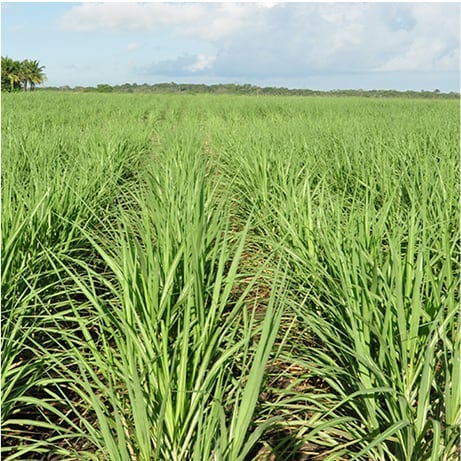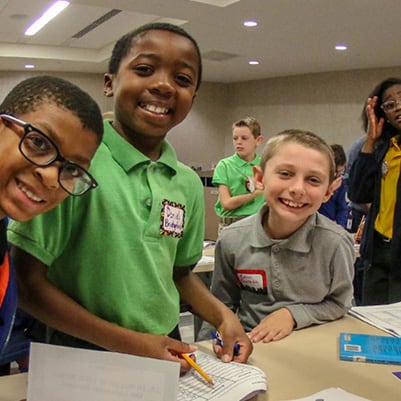Palm Oil
Our Approach to Responsibly Sourced Palm Oil
Sustainably grown palm oil can also reduce pressure on forests and biodiversity, support smallholder farmer livelihoods and improve economic development in palm-growing regions. However, Hershey recognizes that palm oil has impacts to forests, biodiversity and producer communities when not grown or sourced responsibly.
Hershey is committed to the highest standards in responsible and sustainable palm oil sourcing, including our commitment to No Deforestation, No Peat and No Exploitation (NDPE) stated in our Responsible Palm Oil Sourcing Policy. Hershey maintains our commitment to source 100 percent responsibly grown palm oil that is physically certified by the Roundtable on Sustainable Palm Oil (RSPO) and is 100 percent traceable to the mill. We remain committed to achieving 100 percent traceability to the plantation and expect to do this by 2025. We also commit to achieving a verified deforestation-free (VDF) palm supply chain by 2025, while respecting and protecting the human rights of individuals.
We also work with Earthworm Foundation, a nonprofit organization, our supplier partners and the broader industry to assess and address the associated environmental and human rights issues in our supply chain, as we contribute to the responsible and sustainable transformation of the palm sector.
Our Palm Oil Supply Chain
In the first-half of 2025, we sourced from eight direct suppliers: AAK, Alianza/Team Foods, Bunge, Cargill, Fuji Oil, Intercontinenal Specialty Fats, Manorama and Wilmar. 100 percent of the palm oil we source globally is Roundtable on Sustainable Palm Oil (RSPO) Mass Balance and Segregated certified. As needed due to lack of RSPO certified palm or palm kernel oil volumes to meet our demand, Hershey purchases RSPO Credits to cover such gaps.
The palm volumes from H1-2025 have originated from mills in nine countries—though most of the palm oil we source is from Indonesia and Malaysia.
As members of the RSPO, we annually report our palm oil volumes in our Annual Communication on Progress report. We also annually disclose how we comply with the RSPO Shared Responsibility requirements through our MyRSPO profile.
Through our partnership with Earthworm Foundation, we are focused on four strategic areas:
- Supply Chain Traceability: Mapping our palm oil sources at the mill and plantation level to understand high-risk sourcing areas in our palm supply chain and inform where in our palm supply chain we can make the biggest impact
- Supply Chain Monitoring and Verification: Implementing satellite monitoring and verification as we work toward a verified deforestation-free palm supply chain
- Origin Transformation: Investing in on-the-ground programs in our palm supply chain with a focus on protection and restoration of forests and biodiversity, smallholder inclusion, NDPE capacity building and resilience and livelihoods of local palm-growing communities
- External Engagement: Engaging with suppliers and industry to communicate our expectations and strengthen NDPE policies, commitments and performance throughout our palm supply chain
Traceability and Risk Mitigation
Palm oil supply chains are complex and often involve multiple tiers of suppliers as well as intermediaries and smallholder suppliers. Supply chain traceability and purchasing certified palm oil enable us to prioritize our due diligence efforts in monitoring and verifying our palm suppliers’ compliance with our NDPE commitments.
Supply Chain Traceability
On a biannual basis, Hershey conducts a traceability exercise with our palm oil suppliers to understand the universe of potential mills and plantations from where the palm we source could have been produced. In this context, traceability is not a chain of custody concept, and does not alone allow the company to identify the specific source of palm oil used in a given Hershey product. Rather, the list of mills and plantations provided by our suppliers – collected in accordance with industry practice and principles adopted by the Palm Oil Traceability Working Group (TWG) of IDH, The Sustainable Trade Initiative – helps us understand the origin of the palm we purchase (including sources that may be considered high-risk), so that we may direct our resources to the locations where they are most needed.
In H1-2025, our direct suppliers reported 100% traceability to the mill (TTM) level – in other words, our direct suppliers could identify all of the mills from which they directly or indirectly purchased palm oil products during that six-month period, both for Hershey and other purchasers. The 796 mills in the lists provided by our suppliers therefore include mills outside Hershey’s physical supply chain.
In H1-2025, our direct suppliers reported 88% traceability to plantation (TTP) level. With Earthworm Foundation, we strengthened our traceability to plantation criteria. We no longer accept a supplier-reported score, and instead require GPS coordinates or polygon maps of the plantation. Traceability to plantation similarly includes plantations both within and without Hershey’s specific supply chain.
Our partner, Earthworm Foundation, supports us in collating and analyzing these traceability submissions from our suppliers.
We remain committed to achieving 100 percent traceability, through our suppliers, to the plantation level – that is, identification of all plantations from which the reported mills purchase. We recognize the pathway to this goal is complex due to the realities of the palm supply chain, including challenges associated with mapping smallholders.
We provide bi-annual updates on these palm oil tracing efforts on this website and through our annual ESG Report to give stakeholders visibility into our ongoing progress.
Certified Palm Oil
Hershey has been a member of the Roundtable on Sustainable Palm Oil (RSPO) since 2011. By the end of 2014, all of our palm and palm kernel oil purchases for our operations in the U.S. and Canada were 100 percent RSPO Mass Balance-certified palm and palm kernel oil. By the end of 2017, all of our palm oil purchases for Global operations were 100 percent RSPO Mass Balance-certified palm oil and we remain committed to purchasing 100 percent RSPO certified palm and palm kernel oil. We remain committed to purchasing 100 percent RSPO Mass Balance and Segregated certified palm oil. As needed due to lack of RSPO certified palm or palm kernel oil volumes to meet our demand, Hershey purchases RSPO Credits to cover such gaps.
Furthermore, since 2020, Hershey has been a member of the North America Sustainable Palm Oil Network (NASPON), which works to accelerate the uptake of certified sustainable palm oil in North America. Additionally, Hershey has been involved in the Palm Oil Collaboration Group’s Independent Verification Working Group to accelerate effective NDPE commitments with brands, traders, producers and NGOs.
Supply Chain Monitoring and Verification
We expect all of our palm oil sourcing partners (including subcontractors) to be compliant with our Supplier Code of Conduct, uphold our Responsible Palm Oil Sourcing Policy and No Deforestation Policy, and remain compliant to our NDPE position at the corporate-group level.
In addition, to verify that our palm suppliers uphold our standards within their own operations we have enrolled all palm suppliers and their manufacturing sites in our Responsible Sourcing Supplier Program.
As part of this program, all our palm suppliers and sites are required to complete a Self-Assessment Questionnaire, undergo a Sedex Members Ethical Trade Audit (SMETA) 4-pillar audit (or equivalent) and develop corrective action plans to remediate non-compliances.
Palm Oil Grievance Procedure and Log
As outlined in our Grievance Procedure, Hershey takes any reported grievances regarding deforestation, peatland development and exploitation in our palm oil supply chain seriously. If our direct suppliers and their parent and sister companies at the corporate-group level fail to uphold our commitments, they may be removed or suspended from our supply chain in accordance with our sourcing policy.
Listings of grievances and suspended palm companies are disclosed in our Palm Oil Grievance Log.
We bi-annually map our supply chain and monitor and ensure these suspensions are effectively implemented. Suspensions remain in place until we see acceptable, timebound corrective action plans with proven progress that leads to a resolution. We also encourage our suppliers to remain engaged with these suspended parties to push for meaningful and decisive corrective action plans and the establishment of a timeline and progress report.
Engagement for Policy Implementation
Starting in 2019, Hershey began using Earthworm Foundation’s Engagement for Policy Implementation (EPI) tool with several of our direct suppliers. Our suppliers complete a self-assessment questionnaire focused on their palm and NDPE policies, commitments, traceability status, grievance procedure, social and environmental program investments and monitoring and verification activities.
Through EPI, Hershey gains deeper insights into our suppliers’ practices, activities, performance and opportunities for improvement to achieve a responsible palm oil supply chain. We use this data to structure how we engage with our suppliers to identify gaps related to their NDPE policies and commitments. We support our suppliers to develop action plans to close these gaps.
Deforestation Monitoring and Verification
Hershey has committed to achieve a verified deforestation-free (VDF) palm supply chain by 2025, while respecting and protecting the human rights of individuals. Through Airbus’s Starling satellite with Earthworm Foundation, Hershey aims to improve our VDF results and monitors the supply chains of our highest volume suppliers; we plan to extend coverage of our monitoring and verification efforts to our entire palm supply chain.
In addition, we are working in coordination with our suppliers and other Earthworm Foundation members to accelerate efforts. With aligned NDPE commitments and shared suppliers, we are working together to share knowledge and understanding of the industry-wide challenges and exploring potential solutions together in a practical way. We also engage with NGOs with eyes on the ground who proactively monitor landscape changes.
See the Deforestation & Conversion-Free section on our Environment Page.
Monitoring―Starling
Starting in 2020, with Airbus and Earthworm Foundation’s Starling satellite-based service, we began monitoring the supply chains of our highest volume direct suppliers, covering about 80 percent of our palm supply chain (based on 2022 volumes).
For the second year, we conducted a deforestation assessment of all our suppliers using mill lists from mid-year 2021 to mid-year 2022, which verified 58 percent of our volume as deforestation-free. We are on track to achieving our 100 percent objective.
Forest Footprint
In a new step, we engaged Earthworm Foundation to map our Forest Footprints for our palm supply chain in the North Sumatra and Aceh of Indonesia, following the Rainforest Action Network’s methodology. This analysis has enabled us to identify areas of forest, peat and customary land at risk of palm expansion inside and outside concessions. This is part of a larger collaborative effort with two other global companies and Earthworm. We are jointly exploring possible actions for civil society and local actors to protect the standing forests that are outside of palm concessions and thus most at risk for commodity expansion.
Origin Transformation
We continue to invest in landscape collective actions in Indonesia and Malaysia, which are implemented by Earthworm Foundation. These on-the-ground programs focus on the protection and restoration of forests and biodiversity, smallholder inclusion, respect for human rights, NDPE capacity building and the resilience and livelihoods of local palm-growing communities.
We continue to financially support landscape collective actions in the Aceh Landscape in Indonesia and the Southern Central Forest Spine Landscape in Malaysia.
The Aceh Landscape is home to the biodiverse Leuser Ecosystem and the Rawa Singkil Wildlife Reserve and is one of the poorest areas in Indonesia. Between 2016 and 2019, the Aceh Landscape has seen a 60 percent reduction in deforestation, which has directly impacted the livelihoods of 2,095 households through development of Participatory Conservation Plans in five forest-frontier communities.
The Southern Central Forest Spine (SCFS) Landscape in Malaysia is host to critical wildlife corridors for tigers, elephants and other flora and fauna species. Palm oil production in the region poses risks to biodiversity and forest conservation and relies heavily on migrant labor, which makes up 70 percent of the workforce. The SCFS landscape is working to find solutions to these challenges. To date through this program, 16 out of 19 refineries in the landscape have adopted NDPE policies and 26 percent of mills are traceable to plantation, with the objective of reaching 100 percent by 2025.
Leuser Ecosystem
We are deeply concerned about the continued reports of deforestation and peatland development by palm oil companies in Indonesia’s Leuser Ecosystem, which is one of the most biodiverse places on earth and home to many unique landscapes and fauna. As part of Hershey’s commitment to a responsible palm oil supply chain, the environment and human rights, the protection of the Leuser Ecosystem is a priority.
These supply chains are complex and structural issues – embedding solutions takes time. Hershey will continue:
- Working with our direct suppliers to trace our palm oil supply chain to the mill and to the plantation levels that are located near the Leuser Ecosystem
- Engaging our supply chain in the Leuser Ecosystem to strengthen NDPE implementation
- Engaging our suppliers through our grievance procedure when we receive allegations of violators in the Leuser Ecosystem that are not in compliance with our Palm Policy
- Co-funding Earthworm Foundation’s Area for Priority Transformation project in Aceh Tamiang and Southern Aceh, where it overlaps with the Leuser Ecosystem to address deforestation within the two Aceh regions and build NDPE capacity for local actors
- Co-funding Kumacaya in the Rawa Singkil Wildlife Reserve within the Leuser Ecosystem
- Exploring additional opportunities with Earthworm Foundation and suppliers around satellite monitoring systems and deeper engagement with nearby mills and plantations



